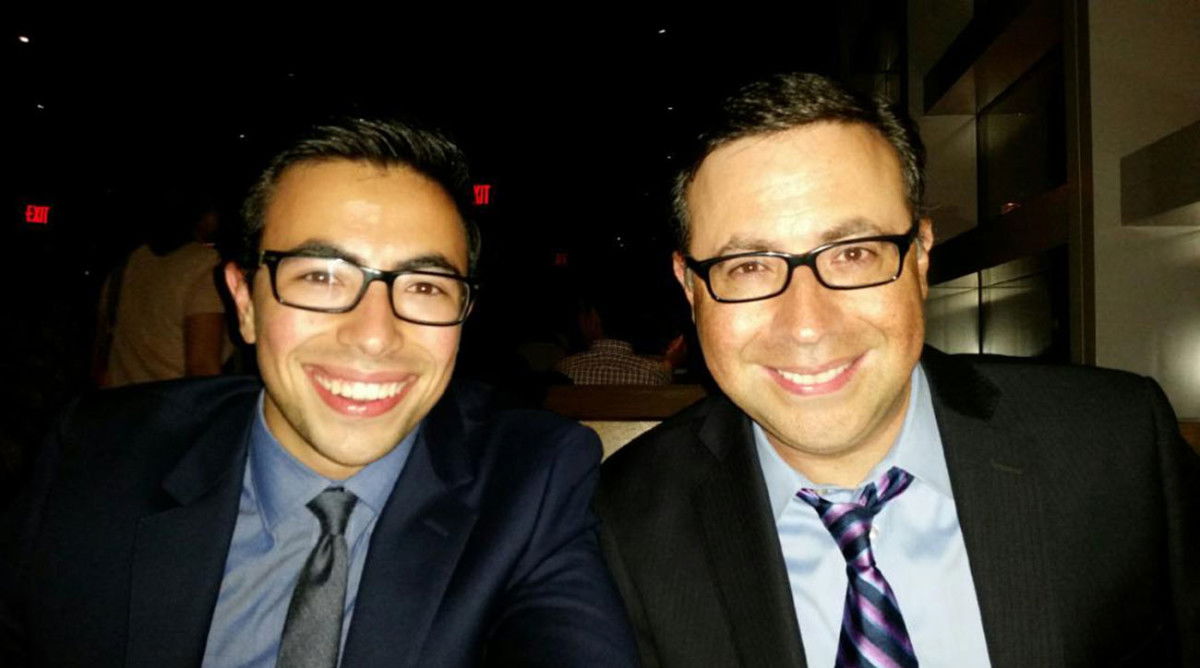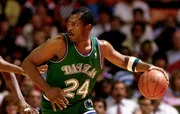

Some voices just hit differently. Not because they’re loud, or booming, or dripping with theatrics. But because they somehow make everything—from a routine layup to a March Madness buzzer-beater—feel iconic. Ian Eagle’s voice? It’s one of those. The kind that feels like a national treasure, whether it’s echoing through your living room on a Sunday NFL broadcast or threading through a college basketball classic. But how did this soundscape sorcerer end up becoming the go-to guy for everything from the NBA to tennis? That journey, people, is filled with equal parts hustle, heritage, and hilarity.
Watch What’s Trending Now!
Ian Eagle’s early life & education
Before the bright lights and high-def cameras, Ian Eagle was just a kid from Miami, Florida, born on February 9, 1969, into a household that already understood the rhythm of performance. His father, Jack Eagle, was a character actor and commercial star (if the name doesn’t ring a bell, the “Brother Dominic” Xerox commercial might jog your memory), while his mother, Monica Maris, had her own run as a performer. So yes, Eagle grew up with punchlines and applause as part of the family dinner soundtrack.
ADVERTISEMENT
And that early exposure to showbiz helped shape his accent, timing, and signature blend of professionalism and personality. He, more than just reporting, performed his storytelling. That flair would follow him to Syracuse University’s Newhouse School, a sacred ground for broadcast hopefuls. There, Eagle became the voice of SU football, basketball, and lacrosse, snagging the Bob Costas Award along the way. Not bad for a kid who probably grew up mimicking his dad’s commercial punchlines, right? But what happened next is just as interesting.
Ian Eagle’s rise in broadcasting
After graduating in 1990, Eagle hit the ground running faster than a slant hill route. His first stop? WFAN in New York, where he honed his skills on one of the country’s top sports radio stations. But he didn’t just float through. By 1994, Eagle was already doing play-by-play for the New Jersey Nets. And while the team may not have always made headlines, Ian’s voice certainly did.
ADVERTISEMENT
Because that early Nets work was more than just court-side reps, as it became his proving ground. Eagle showed he could take even the most mundane Wednesday night matchup and spin it into a moment. His voice added gravitas to games, a style that was equal parts precise and playful. Fans started tuning in for the team and the guy calling it. Then came calling the big leagues in 1998 when Eagle joined CBS Sports.
Top Stories
Ex-ESPN Anchor Calls Out a Hidden Caitlin Clark Problem Few Are Acknowledging

Who Is Mark Aguirre’s Wife? Everything to Know About Ex-Mavericks Star’s Marriage and Family

Warriors Announce Giannis Antetokounmpo Trade Plan – 3 Teams That Can Match the Offer Ft. Knicks

Caitlin Clark Fans Reignite Old Beef With Warriors’ Brandin Podziemski After Viral Moment

Was Jaylon Tyson Fined $35K for Disrespecting LeBron James? Fact-Checking Viral Rumor

ADVERTISEMENT
Ian Eagle’s national prominence & major roles
And just like that, the kid from Miami was calling NFL games on Sundays, NCAA basketball in March, U.S. Open tennis in the summer, and even boxing when the gloves came off. If it had a scoreboard, chances are Ian Eagle had a call sheet ready.
In time, he would become the voice of the Brooklyn Nets on YES Network, lead NBA announcer for TNT, and a staple across CBS and Westwood One radio for NFL coverage. His presence became synonymous with high-stakes games and calm-but-colorful commentary.
Ian Eagle… became a translator for chaos, so to speak. Whether it’s a fourth-down stand or a baseline jumper, he tells the story in real-time with clarity, context, and yes, some of the best one-liners in the game. And so naturally, the honors? Oh, they came rolling in like a full-court press.
ADVERTISEMENT
Ian Eagle’s key achievements and honors
In 2022 and again in 2024, Ian Eagle was named National Sportscaster of the Year. He also succeeded Jim Nantz as CBS/TBS’s lead voice for the NCAA Tournament Finals starting in 2024, a passing of the mic that symbolized a true changing of the guard.
Add to that multiple New York Sports Emmys, induction into the Syracuse WAER Hall of Fame, and the prestigious Marty Glickman Award for leadership in sports media in 2018, and you’ve got a resume that screams elite. But what about his personal life? Does the man even have a work-life balance with all the glory that comes with the broadcasting world?
ADVERTISEMENT
Ian Eagle’s personal life
Behind the mic, Ian Eagle leads a life grounded in family and legacy. He’s married to Alisa Beth Terry, and they share two children, including son Noah Eagle, who’s already making waves in sports broadcasting. (Yes, the pipes run in the family.)
And well, it makes sense. Raised in a home where showbiz and storytelling were the norm, Ian has continued that lineage with a modern twist. His parents’ performing in Catskills and New York venues helped shape his on-camera presence as well.
ADVERTISEMENT
Why does Ian Eagle stand out?
Let’s put it this way: if play-by-play announcing were a team sport, Ian Eagle would be the floor general, the one who makes everyone around him better. He’s called everything from Ja Morant’s soaring slams to buzzer-beaters in March, yet never lets the moment overshadow the players. What separates Eagle is that he doesn’t try to be the show. He serves it. And yet, somehow, he’s always unforgettable.
His signature blend of humor and precision adds a unique texture to every game, whether it’s a sleepy Sunday NFL matchup or a Final Four classic. Fans remember the plays, but they also remember the voice that brought them to life. His chemistry with partners like Bill Raftery, Grant Hill, and sideline ace Tracy Wolfson is palpable… less like coworkers and more like a tight-knit pickup squad that’s been running full-court together for years. They trust each other, lob jokes as seamlessly as stats, and never miss a beat when the game goes sideways.
ADVERTISEMENT
That harmony isn’t accidental. Eagle’s attention to detail is almost surgical. He prepares relentlessly, mastering rosters, backstories, and tendencies so that his reactions are sharp, but never rehearsed. It’s why coaches trust him, players love him, and viewers feel like they’re in on the joke. And his viral moments?
They’re not flukes. They’re the product of years spent understanding not just how to watch a game, but how to see it. From puns to punchlines to perfectly timed pauses, Eagle brings joy back into commentary. In a sports media world that often leans into hot takes and shouting matches, Ian Eagle simply lets the game… breathe.
That’s why he stands out. Not just because he’s good, but because he’s consistently good, across decades, platforms, and generations. He’s the guy who makes you turn the volume up, not down. And in the modern age of multiscreen sports and social media distractions, that might just be the biggest win of all.
ADVERTISEMENT
ADVERTISEMENT
ADVERTISEMENT
ADVERTISEMENT